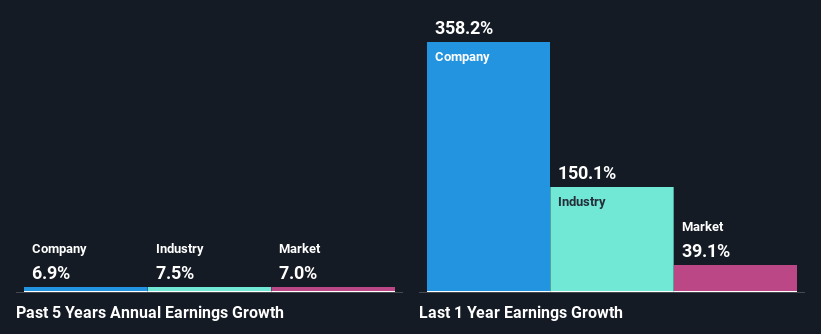Residential Secure Income plc's (LON:RESI) Financials Are Too Obscure To Link With Current Share Price Momentum: What's In Store For the Stock?
Residential Secure Income (LON:RESI) has had a great run on the share market with its stock up by a significant 11% over the last month. However, we wonder if the company's inconsistent financials would have any adverse impact on the current share price momentum. In this article, we decided to focus on Residential Secure Income's ROE.
ROE or return on equity is a useful tool to assess how effectively a company can generate returns on the investment it received from its shareholders. Put another way, it reveals the company's success at turning shareholder investments into profits.
View our latest analysis for Residential Secure Income
How To Calculate Return On Equity?
ROE can be calculated by using the formula:
Return on Equity = Net Profit (from continuing operations) ÷ Shareholders' Equity
So, based on the above formula, the ROE for Residential Secure Income is:
6.2% = UK£11m ÷ UK£182m (Based on the trailing twelve months to September 2021).
The 'return' is the yearly profit. That means that for every £1 worth of shareholders' equity, the company generated £0.06 in profit.
What Is The Relationship Between ROE And Earnings Growth?
We have already established that ROE serves as an efficient profit-generating gauge for a company's future earnings. Depending on how much of these profits the company reinvests or "retains", and how effectively it does so, we are then able to assess a company’s earnings growth potential. Assuming everything else remains unchanged, the higher the ROE and profit retention, the higher the growth rate of a company compared to companies that don't necessarily bear these characteristics.
Residential Secure Income's Earnings Growth And 6.2% ROE
When you first look at it, Residential Secure Income's ROE doesn't look that attractive. Next, when compared to the average industry ROE of 8.8%, the company's ROE leaves us feeling even less enthusiastic. Residential Secure Income was still able to see a decent net income growth of 6.9% over the past five years. So, there might be other aspects that are positively influencing the company's earnings growth. For example, it is possible that the company's management has made some good strategic decisions, or that the company has a low payout ratio.
We then performed a comparison between Residential Secure Income's net income growth with the industry, which revealed that the company's growth is similar to the average industry growth of 7.5% in the same period.
Earnings growth is a huge factor in stock valuation. What investors need to determine next is if the expected earnings growth, or the lack of it, is already built into the share price. Doing so will help them establish if the stock's future looks promising or ominous. One good indicator of expected earnings growth is the P/E ratio which determines the price the market is willing to pay for a stock based on its earnings prospects. So, you may want to check if Residential Secure Income is trading on a high P/E or a low P/E, relative to its industry.
Is Residential Secure Income Using Its Retained Earnings Effectively?
Residential Secure Income has a very high three-year median payout ratio of 114% suggesting that the company's shareholders are getting paid from more than just the company's earnings. However, this hasn't really hampered its ability to grow as we saw earlier. That being said, the high payout ratio could be worth keeping an eye on in case the company is unable to keep up its current growth momentum. You can see the 3 risks we have identified for Residential Secure Income by visiting our risks dashboard for free on our platform here.
Besides, Residential Secure Income has been paying dividends over a period of four years. This shows that the company is committed to sharing profits with its shareholders. Our latest analyst data shows that the future payout ratio of the company over the next three years is expected to be approximately 94%. However, Residential Secure Income's future ROE is expected to decline to 3.4% despite there being not much change anticipated in the company's payout ratio.
Conclusion
On the whole, we feel that the performance shown by Residential Secure Income can be open to many interpretations. While no doubt its earnings growth is pretty substantial, its ROE and earnings retention is quite poor. So while the company has managed to grow its earnings in spite of this, we are unconvinced if this growth could extend, especially during troubled times. That being so, the latest analyst forecasts show that the company will continue to see an expansion in its earnings. To know more about the latest analysts predictions for the company, check out this visualization of analyst forecasts for the company.
Have feedback on this article? Concerned about the content? Get in touch with us directly. Alternatively, email editorial-team (at) simplywallst.com.
This article by Simply Wall St is general in nature. We provide commentary based on historical data and analyst forecasts only using an unbiased methodology and our articles are not intended to be financial advice. It does not constitute a recommendation to buy or sell any stock, and does not take account of your objectives, or your financial situation. We aim to bring you long-term focused analysis driven by fundamental data. Note that our analysis may not factor in the latest price-sensitive company announcements or qualitative material. Simply Wall St has no position in any stocks mentioned.

 Yahoo Finance
Yahoo Finance 
